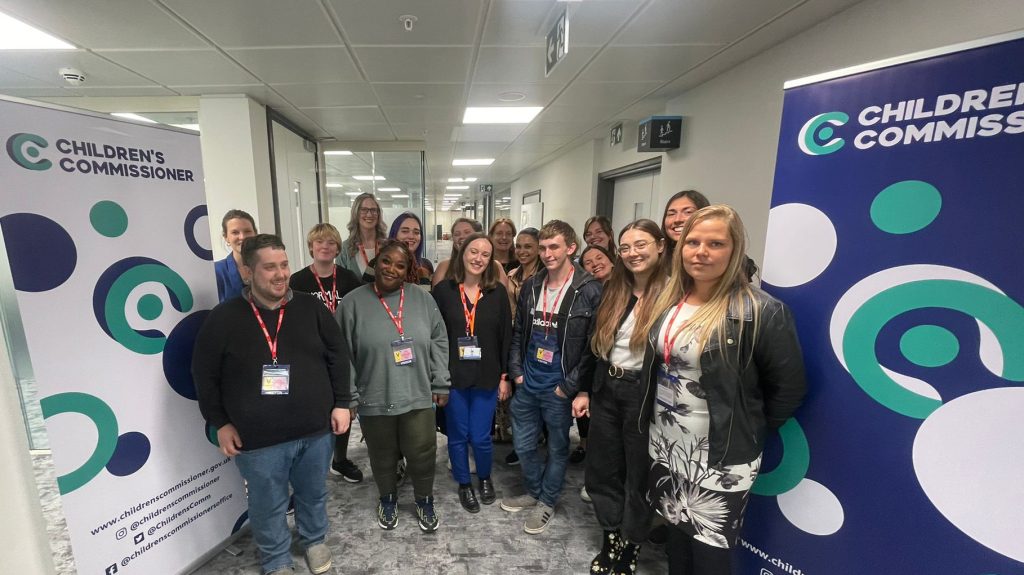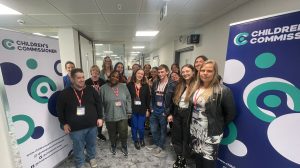
Children’s social care is a core pillar of the Children’s Commissioner’s work.
In The Big Ask, the largest ever survey of children in England that the Children’s Commissioner ran last year, care-experienced children and young people shared that they have the same hopes and aspirations as their peers. They explained that they want the care system to provide them with a supportive foundation to achieve their goals, and to set them up for happy, healthy lives, in which they can thrive. They also want strong relationships with the adults in their lives that last.
The Children’s Commissioner is dedicated to building a better care system based around the voices of children and young people who have experienced the system first hand. Meeting with these groups to hear their thoughts is key to ensuring this.
It was brilliant to host a visit to the Children’s Commissioner’s office for a group of care leavers from the National Youth Advocacy Service (NYAS) Campaigns Youth Advisory Group and get their thoughts on the work we’re doing as well as sharing how we are involving care-experienced young people throughout it.
During the session we discussed the key pillars of the Children’s Commissioner’s work and how these were developed from what children told us in The Big Ask. Some of the thoughts the care leavers had within these were: to make sure all young people have a school, that there were strong vocational pathways as a real alternative to university and for there to be information and support around the different alternatives. For there to be better information and access to support services, like mental health. Help with independent living such as increased support with budgeting and housing. Along with enhanced training and support for professionals especially in communicating with young people and having case load regulation for Personal Advisers.
We then shared how the Office works and how we translate children’s voices into policy asks, and how statistics and data help us do more for children and put them at the heart of important topics. The Help at Hand team led a brilliant discussion around advocacy, the benefits and what needs to improve and the IMO (In My Opinion) team shared more about the digital platform and how it helps provide a space for care experienced young people to share their experiences.
Some of the things that the young people felt were particularly important are shared in these quotes from the group
On improving relationships with professionals:
“There needs to be a clear sort of training on how to communicate with young people, especially in trauma experienced young people, and especially children with additional learning needs.”
“Communication training. For anyone working with young people, especially young people in care. For me, it’s not what you say it’s how you say it, it’s not what you do is how you do it.”
“I think being quite clear about the limits of your role, but also guiding that young person to someone who can support them through whatever they’re going through is very important.”
On advocacy:
“With advocacy it’s so important that you have that extra person”
“I think it’s about the understanding for not just professionals, but for local authorities as to what an advocates role is, I think a lot of the time they see it as an attack…whereas it’s just a young person who feels like they cannot communicate with those who are making decisions for them. And they’re not being heard. So I think, definitely, there would need to be more education for local authorities on how because not every young person even knows that they can access an advocate.”
On mental health support:
“A lot of children feel frightened to speak up or to even ask for support.”
“There isn’t enough information out there. And it’s the way they deliver the information.”
“Some of us, we have mental health, and we’re like, oh, should we have a child like social services will be involved with us as soon as we have a child.”
On independent living and life skills:
“I think that’s the saddest part…we start to accept the statistics that we see. We hate that word [statistics]. Where there’s more children, young people in care, likely to be homeless, but has anyone taught them about budgeting. Has anyone taught them how to keep a house.”
“I left social services, and had a support worker for six weeks, and she set up all my bills, I thought I’m good to go for the rest of my life. I moved properties and have to start it all again.”
“You don’t stop asking for help from your parents when you’re 25. Even if it’s for basic things or saying oh do you know what I’m struggling.”
On being treated equally:
“As much as we keep talking about children in care as a community by itself, all children really want to do is to be treated equally.”
“Children in care, you know, I want all children to have the same access to the same opportunities. I want them to feel like they can do anything and they can reach beyond regardless of where they’ve come from, regardless of what they’ve been through.”
“Care experienced young people need to be treated as individuals not statistics”
The session provided great insights and built on the work we are doing in the different pillars as well as in improving the care system specifically. We were grateful we had the chance to meet the young people and hear some of their experiences and witness their immense passion for making things better for the next generation. We look forward to hearing more from these young people and from care experienced young people across England, and working to make their ideas for improvement a reality.
If you are a child in care, a child working with social services or their advocate, and you are not in school please contact Help at Hand on 08005280731 (freephone) or [email protected] .






